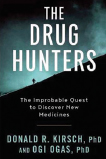BOOKMARK
Title: The Drug Hunters: The Improbable Quest to Discover New Medicines
Authors: Donald R. Kirsch, PhD, and Ogi Ogas, PhD
Publisher: Arcade Publishing
Publication date: January 2017
Price: $24.99, hardcover, 328 pages

Only about 1 in 100 drug discovery projects initiated by the pharmaceutical industry results in a U.S. Food and Drug Administration–approved drug. It is a risky and ultraexpensive enterprise: Among myriad failures, it has produced pharmaceutical products that have saved countless lives. Drug discovery is also a scientific adventure story.
“Over the course of my nearly 4-decade career as a drug hunter, I’ve learned first-hand that new medicines are often discovered by routes that are wildly circuitous or entirely fortuitous,” writes Donald R. Kirsch, PhD, coauthor of a new, delightfully entertaining, and informative book, The Drug Hunters: The Improbable Quest to Discover New Medicines.
Dr. Kirsch, a self-described drug hunter, comes well equipped for this book. He holds 24 drug-related patents, has written more than 50 papers, has been a leader in a host of pharma companies, and currently teaches drug discovery at Harvard Extension School. His coauthor, Ogi Ogas, PhD, is an accomplished science writer.
Bridging History
The book is arranged into 12 chapters, telling colorful stories of the search for new medicines from our Neolithic forebears to today’s highly competitive drug pipelines. His introduction gives readers a glimpse into what they can expect; it also demonstrates the creative story-telling powers of his coauthor.
Sometime around 3300 BC, an unfortunate man struggling through the high peaks of the Alps in Italy fell into a crevasse and lay frozen for more than 5,000 years until discovered by hikers. Scientists thawed the poor guy out and discovered his intestines were infested with whipworms. To their surprise, they found he had fungi wrapped in his bearskin leggings, which upon examination had antiworm properties. In essence, they discovered the oldest medicine kit ever found, demonstrating the invaluable part that chance and trial and error play in our medical history.
The authors do a good job bridging the history of early exotic drug exploration with today’s modern research and development programs. Reading about our prehistoric forebears, who harbored an extravagant menagerie of supernatural beliefs about the medicinal powers of foul-smelling herbal concoctions, may strike a chord with today’s oncologists, whose patients are seduced by a multitude of online alternative cancer therapies. The history of opium, first used by the Sumerians as early as 3400 BC, referred to as the “joy plant,” gives the reader insight into the same problems of opioid addiction we’re dealing with today.
Remarkably, in 1898, researchers at Bayer Company created a novel chemical variation of morphine dubbed “heroin,” because it was supposed to have heroic effects in treating disease. A Sears Roebuck catalogue actually peddled a handy heroin kit with a syringe, two vials of heroin, and a carrying case—all for the bargain price of $1.50. That bizarre historical flashback aside, pain relief is paramount in the cancer community, and the authors explicate the history and scientific development of morphine, the golden standard in cancer pain relief.
Story of the Birth Control Pill
Perhaps the most interesting chapter in the book is the story of the birth control pill. The authors take the reader on a scientific history tour with a cast of colorful characters: a Swiss veterinarian; an eccentric chemist in the backwaters of Mexico; a discredited biologist; and Margret Sanger, the founder of Planned Parenthood, who was indicted in 1915 under the antiobscenity Comstock Law for selling diaphragms through the mail. There are few medical innovations in history that have transformed the fabric of society so quickly and dramatically as The Pill, and for most readers, this history will be new terrain, demonstrating that the drugs and medicines we now take for granted came at dear prices.
The Drug Hunters is a well-written and highly informative book, although a bit preachy toward the end, but that’s a small gripe. And although cancer drugs are not featured, this book is recommended for The ASCO Post readers, especially as a travel companion. ■

